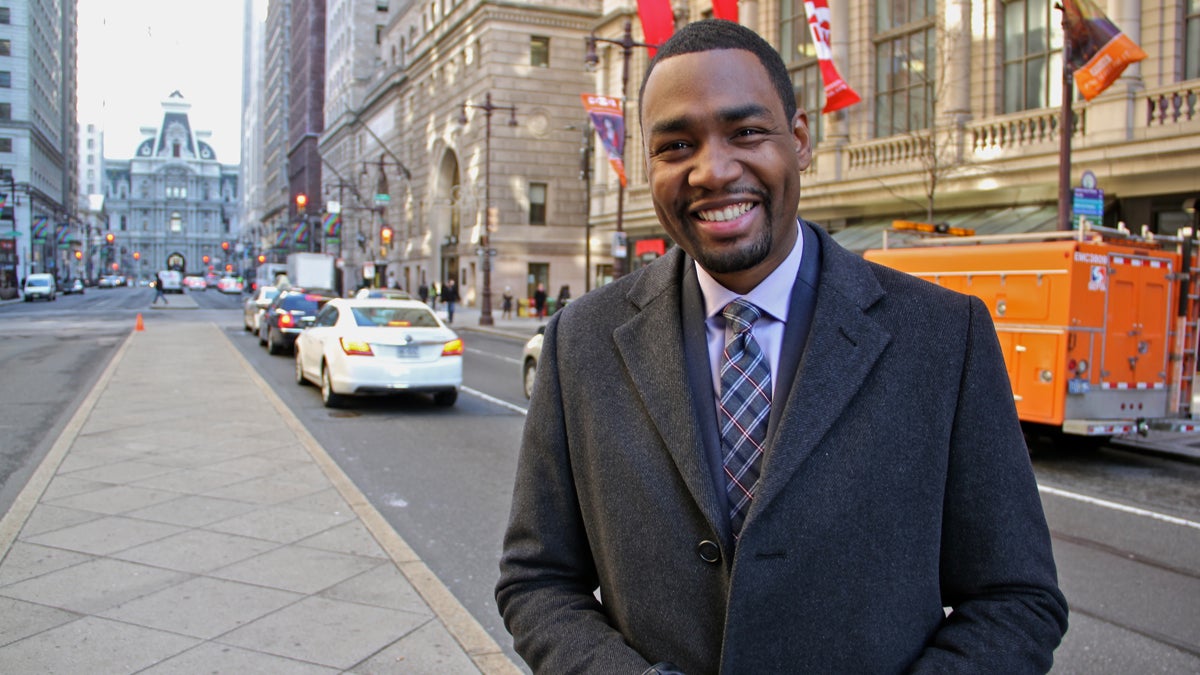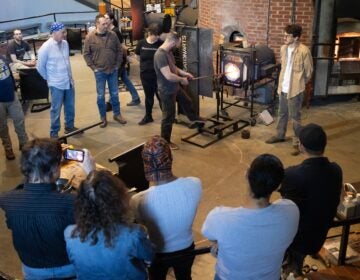Who is Doug Oliver? The young, relatively unknown mayoral hopeful with nothing to lose talks Philly schools

Candidate for mayor Doug Oliver. (Emma Lee/WHYY)
Doug Oliver wants Philadelphians to face harsh facts and make tough choices when it comes to education spending.
Having just stepped down from his post as senior vice president of marketing and corporate communication for Philadelphia Gas Works to run for mayor, Oliver speaks like a man with nothing to lose.
In a message that’s sure rankle education advocates, Oliver seems willing put the “make Harrisburg pay” mantra in the backseat.
Like the rest of the candidates, Oliver says that state government needs to provide more funding for Philadelphia public schools.
“The pie is not big enough,” he said, and “a funding formula needs to be implemented.”
But Oliver takes a much sharper tone when discussing the realities of bringing more resources to Philadelphia classrooms.
“We’ve gone to Harrisburg again and again and again, and we’ve demanded and we’ve demanded and we’ve demanded,” he said. “The challenge with what we’ve done to this point–not that it’s wrong; It’s not wrong – is that it’s been ineffective.”
Oliver has yet to formally announce his candidacy, which he says he’ll likely do in early February.
Before his PGW gig, Oliver served as Mayor Michael Nutter’s press secretary from January 2008 to September 2010.
The other announced candidates at this point are all democrats: State Sen. Anthony Hardy Williams, former Philadelphia District Attorney Lynne Abraham, former city solicitor Ken Trujillo, former State Sen. T. Milton Street – brother of former Mayor John Street – and former Common Pleas Court Judge Nelson Diaz. [Update: Trujillo dropped out of the race after this story was posted.]
The primary will be held on May 19.
On education funding, Oliver says Harrisburg has “reached down into its pocket and pulled out zeros, and everybody got mad at Governor Corbett and x,y, and z, and we didn’t get what we needed and schools are feeling the pinch.”
Many state legislators would object to that characterization, citing the passage of two recent pieces of authorizing legislation: one that allowed Philadelphia to raise its tax on cigarettes, another that allowed the city to make permanent its one percent sales tax extension.
Neither directed more state funding to city schools, but simply allowed Philadelphians to tax themselves.
With a state legislature that grew more republican in the last election, Oliver thinks it’s foolish to expect Gov-elect Tom Wolf to be Philadelphia’s funding rainmaker.
Oliver offered an analogy in which as he goes to work for PGW everyday, but week by week does not receive a paycheck. And week by week, his son comes to him hungry, begging for food.
“And at the end of the month he’s famished. He’s about to fall over dead. He hasn’t eaten a thing and he’s like, ‘Dad, please, I’m hungry. And I start jumping up and down, saying, ‘PGW, Pay me now! Pay me now! Pay me now!'” he said.
“You can say that all you want. At some point, most parents are going to look and say, ‘Hey, Doug, shut up. Why don’t you go get a job at Home Depot or McDonalds or shovel some snow or mow some lawns, but do whatever it is you need to do – make the sacrifice to put some food in your son’s mouth – until whatever’s jamming up the money coming from the place where it should come is freed,'” he said.
Oliver thinks of state education funding from the perspective of citizens and legislators in districts far from Philadelphia. He says even if they can extrapolate to a position that takes into account the importance of solving Philadelphia funding crisis, that position is undermined.
“Any new funding source that’s come from the state in the last ten-fifteen years has been eaten up by rising pension and healthcare costs,” he says. “So it doesn’t even make it to the classroom.”
So, Oliver says, voters in western Pennsylvania react cyncially to cries for more education funding, knowing the money will go to pensions and health care in Philadelphia.
“You don’t even get the moral high ground of saying we’re educating kids,” he said.
Oliver says, personally, he’s willing to pay more taxes for schools, but “only if it’s getting to the classroom.”
“But to just keep on raising taxes and taxes and say ‘it’s for schools, it’s for schools,’ and have it go to pensions and health care and banging the gavel and telling Harrisburg ‘pay pay pay!’ And they say, ‘No, no, no.’ We say ‘pay, pay, pay.’ Well I heard you, then, ‘No, no, no.’ At some point it becomes laughable,” he said.
More than a ‘tweak’
Oliver says next mayor needs “to come prepared to do more than just tweak around the edges.”
“I think we’ve been doing that long enough,” he said, “and I think we’re living the results of those modest tweaks. We’re playing in the margins.”
Oliver clarified that he believes that former mayors Nutter, Street and Rendell have “advanced the ball,” and that the Philadelphia School district is “better off than where we were.”
But, he said, “I am proposing that there’s a more aggressive schedule that we should be on to get to the system that we think educates our kids.”
Oliver says that schedule will take hard choices and short-term sacrifices by Philadelphia citizens. Parents are willing to “fall on their faces” for their children; so too, he says, should a city.
“As a city, falling on your face may mean, listen, we’ve got to find out what the core services of government are so that we’re not spending our resources on other things when we quite frankly need them for our schools,” he said. “What are we willing to give up so that our kids can succeed?”
Candidate Ken Trujillo has differentiated himself from the current field of mayoral candidates by calling for the abolition of the Philadelphia School Reform Commission.
Oliver thinks “local control is a good thing,” but says he prefers the “accountability that state control maintains.”
Oliver says no mayor that’s elected this year will have a four-year turnaround of success – that the “credit will be for some future generation mayor” reaping the benefits of today’s hard choices
Backstory
Oliver grew up in the Happy Hollow neighborhood of lower Germantown, and his school history reads like many who grew up in Philadelphia: long and ever-changing.
First he attended Greenfield elementary in Center City. “I have no idea how I got there,” he said, attributing the long commute to a mother whose passion was to give him the best educational opportunities.
He moved on to High Street Christian Academy in Northwest Philly and Cedar Grove Christian Academy in Northeast Philadelphia.
“And then I couldn’t behave myself and got kicked out,” he said.
He then attended two district schools: Pickett middle school and Samson-Freedman, where he finished eighth grade. For high school, he attended the Milton Hershey School, a private boarding institution in Dauphin County for children from low-income families.
“I don’t think parents should have to work that hard to find an educational opportunity for their kid,” he said.
Oliver received a bachelor’s degree from Lock Haven University, a master’s in communications from LaSalle University, and an M.B.A. from St. Joseph’s University.
His son attends Phil-Mont Christian Academy in Glenside, Pa.
Oliver had originally planned to resign from PGW at the end of January, but accelerated his depature after Councilman Jim Kenney – who is considering a mayoral bid – complained of Oliver’s appearance in a prime-time television ad for the utility’s Low Income Home Energy Assistance Program (LIHEAP).
Underdog
As a relatively unknown candidate whose education platform calls for city sacrifices and decreased pension and healthcare benefits for teachers and city workers, Oliver admits his campaign will face an uphill battle.
“I don’t come into it with buckets of cash or people waiting to throw it at me,” he says, agreeing that those buckets will have to come eventually if he has a shot at winning.
But Oliver cites Sam Katz’s near-win as a Republican in 1999 and Michael Nutter’s come from behind win in 2007 as evidence that underdogs can defy expectations.
He also notes that money tends to come in the final hours, because “most people don’t give because they believe what you believe.”
“Unfortunately they give for access,” he says. “And that’s not noble.”
But he believes that if he can manage to remain relevant, repeat his message and “stay strong,” money will start to flow.
“People, if they even think you have a chance, they’ll give you something,” he said, “and the guy who’s used to having nothing and doing something with nothing has an advantage over the guy who has a lot and doesn’t know what to do.”
WHYY is your source for fact-based, in-depth journalism and information. As a nonprofit organization, we rely on financial support from readers like you. Please give today.





